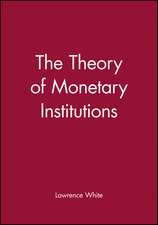Behind the Development Banks: Washington Politics, World Poverty, and the Wealth of Nations: Emersion: Emergent Village resources for communities of faith
Autor Sarah Babben Limba Engleză Hardback – 15 iun 2009
The World Bank and other multilateral development banks (MDBs) carry out their mission to alleviate poverty and promote economic growth based on the advice of professional economists. But as Sarah Babb argues in Behind the Development Banks, these organizations have also been indelibly shaped by Washington politics—particularly by the legislative branch and its power of the purse.
Tracing American influence on MDBs over three decades, this volume assesses increased congressional activism and the perpetual “selling” of banks to Congress by the executive branch. Babb contends that congressional reluctance to fund the MDBs has enhanced the influence of the United States on them by making credible America’s threat to abandon the banks if its policy preferences are not followed. At a time when the United States’ role in world affairs is being closely scrutinized, Behind the Development Banks will be necessary reading for anyone interested in how American politics helps determine the fate of developing countries.
Tracing American influence on MDBs over three decades, this volume assesses increased congressional activism and the perpetual “selling” of banks to Congress by the executive branch. Babb contends that congressional reluctance to fund the MDBs has enhanced the influence of the United States on them by making credible America’s threat to abandon the banks if its policy preferences are not followed. At a time when the United States’ role in world affairs is being closely scrutinized, Behind the Development Banks will be necessary reading for anyone interested in how American politics helps determine the fate of developing countries.
| Toate formatele și edițiile | Preț | Express |
|---|---|---|
| Paperback (1) | 277.53 lei 6-8 săpt. | |
| University of Chicago Press – 15 iun 2009 | 277.53 lei 6-8 săpt. | |
| Hardback (1) | 556.65 lei 6-8 săpt. | |
| University of Chicago Press – 15 iun 2009 | 556.65 lei 6-8 săpt. |
Din seria Emersion: Emergent Village resources for communities of faith
-
 Preț: 144.99 lei
Preț: 144.99 lei -
 Preț: 133.99 lei
Preț: 133.99 lei - 9%
 Preț: 352.50 lei
Preț: 352.50 lei -
 Preț: 146.50 lei
Preț: 146.50 lei -
 Preț: 208.32 lei
Preț: 208.32 lei -
 Preț: 156.84 lei
Preț: 156.84 lei -
 Preț: 115.53 lei
Preț: 115.53 lei -
 Preț: 548.71 lei
Preț: 548.71 lei - 8%
 Preț: 346.31 lei
Preț: 346.31 lei - 8%
 Preț: 360.28 lei
Preț: 360.28 lei -
 Preț: 216.90 lei
Preț: 216.90 lei -
 Preț: 101.43 lei
Preț: 101.43 lei -
 Preț: 215.52 lei
Preț: 215.52 lei -
 Preț: 185.37 lei
Preț: 185.37 lei - 8%
 Preț: 563.24 lei
Preț: 563.24 lei -
 Preț: 179.04 lei
Preț: 179.04 lei -
 Preț: 106.35 lei
Preț: 106.35 lei -
 Preț: 138.81 lei
Preț: 138.81 lei -
 Preț: 273.93 lei
Preț: 273.93 lei -
 Preț: 127.89 lei
Preț: 127.89 lei - 9%
 Preț: 353.24 lei
Preț: 353.24 lei -
 Preț: 176.49 lei
Preț: 176.49 lei -
 Preț: 94.22 lei
Preț: 94.22 lei -
 Preț: 144.80 lei
Preț: 144.80 lei -
 Preț: 126.25 lei
Preț: 126.25 lei -
 Preț: 67.35 lei
Preț: 67.35 lei -
 Preț: 163.52 lei
Preț: 163.52 lei -
 Preț: 138.26 lei
Preț: 138.26 lei -
 Preț: 182.98 lei
Preț: 182.98 lei - 18%
 Preț: 502.35 lei
Preț: 502.35 lei - 18%
 Preț: 2261.34 lei
Preț: 2261.34 lei -
 Preț: 279.55 lei
Preț: 279.55 lei -
 Preț: 116.07 lei
Preț: 116.07 lei -
 Preț: 208.55 lei
Preț: 208.55 lei -
 Preț: 167.85 lei
Preț: 167.85 lei -
 Preț: 160.63 lei
Preț: 160.63 lei -
 Preț: 183.89 lei
Preț: 183.89 lei - 9%
 Preț: 352.77 lei
Preț: 352.77 lei -
 Preț: 307.55 lei
Preț: 307.55 lei - 12%
 Preț: 290.56 lei
Preț: 290.56 lei - 8%
 Preț: 311.68 lei
Preț: 311.68 lei -
 Preț: 120.81 lei
Preț: 120.81 lei -
 Preț: 229.92 lei
Preț: 229.92 lei - 6%
 Preț: 324.95 lei
Preț: 324.95 lei -
 Preț: 145.41 lei
Preț: 145.41 lei -
 Preț: 152.07 lei
Preț: 152.07 lei -
 Preț: 186.09 lei
Preț: 186.09 lei - 18%
 Preț: 348.59 lei
Preț: 348.59 lei -
 Preț: 302.76 lei
Preț: 302.76 lei - 8%
 Preț: 565.01 lei
Preț: 565.01 lei
Preț: 556.65 lei
Preț vechi: 722.91 lei
-23% Nou
Puncte Express: 835
Preț estimativ în valută:
106.52€ • 113.90$ • 88.81£
106.52€ • 113.90$ • 88.81£
Carte tipărită la comandă
Livrare economică 17 aprilie-01 mai
Preluare comenzi: 021 569.72.76
Specificații
ISBN-13: 9780226033648
ISBN-10: 0226033643
Pagini: 336
Ilustrații: 7 line drawings, 6 tables
Dimensiuni: 152 x 229 x 27 mm
Greutate: 0.57 kg
Editura: University of Chicago Press
Colecția University of Chicago Press
Seria Emersion: Emergent Village resources for communities of faith
ISBN-10: 0226033643
Pagini: 336
Ilustrații: 7 line drawings, 6 tables
Dimensiuni: 152 x 229 x 27 mm
Greutate: 0.57 kg
Editura: University of Chicago Press
Colecția University of Chicago Press
Seria Emersion: Emergent Village resources for communities of faith
Notă biografică
Sarah Babbis associate professor of sociology at Boston College. She is the author of Managing Mexico: Economists from Nationalism to Neoliberalism and coauthor of Economy/Society: Markets, Meanings, and Social Structure.
Cuprins
Preface
Introduction
Chapter 1. The Banks and Their Shareholders
Chapter 2. The Congressional Revolt
Chapter 3. The Reagan Revolution
Chapter 4. Disciplining the Banks
Chapter 5. The Emergence of the Washington Consensus
Chapter 6. The Consensus Evolves
Chapter 7. The Banks and Civil Society
Chapter 8. Into the New Millennium
Notes
Bibliography
Index
Introduction
Chapter 1. The Banks and Their Shareholders
Chapter 2. The Congressional Revolt
Chapter 3. The Reagan Revolution
Chapter 4. Disciplining the Banks
Chapter 5. The Emergence of the Washington Consensus
Chapter 6. The Consensus Evolves
Chapter 7. The Banks and Civil Society
Chapter 8. Into the New Millennium
Notes
Bibliography
Index
Recenzii
“I know of no other book which examines full-on the impact of Washington politics—and especially the unique split between executive branch and legislative branch in the American polity—on the functioning of a multilateral organization. Sarah Babb has delved deeply into archival sources and supplemented them with more academic literature and some interviews. The result is a well-written book, accessible to a wide readership and not just to students and scholars.”
“In an era dominated by a world banking crisis and calls for transparency in government, Sarah Babb has opened the black box of ‘donor politics’: how international financial institutions are controlled by shareholder governments. Amassing solid evidence from myriad sources, she shows how Washington politics have shaped U.S. policies, which lead multilateral banks to tie loans to policy, in turn setting off debates among development experts. A brilliant sociology of political and policy history, the dark side of organizations, and global economic development.”
"An excellent book about the linkage between US domestic politics and the performance of these institutions. Babb shows how the shifts in the power of right- or left-wing blocs in Congress tie various policy strictures to the funds that are approved. . . . Thus the development banks are obligated to fold into their mandates aspects of strategic, economc, and humanitarian rationales that are of current concern in Washington."













